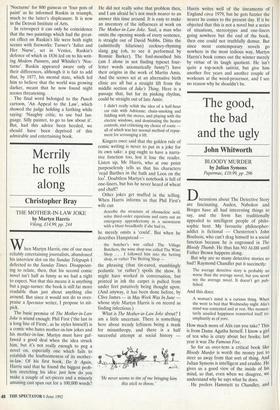Merrily he rolls along
Christopher Bray
THE MOTHER-IN-LAW JOKE by Martyn Harris Viking, £14.99, pp. 244 When Martyn Harris, one of our most reliably entertaining journalists, abandoned his interview slot on the Sunday Telegraph I defected to the Sunday Times. Disappoint- ing to relate, then, that his second comic novel isn't half as funny as we had a right to expect. Not that this means it is anything but a page-turner: the book is still far more readable than just about anything else around. But since it would not do to over- praise a Spectator writer, I propose to nit- pick.
The basic premise of The Mother-in-Law Joke is sound enough: Phil First ('the last in a long line of Firsts', as he styles himself) is a comic who hates mother-in-law jokes and his mother-in-law. Martyn must have guf- fawed a good deal when the idea struck him, but it's not really enough to peg a novel on, especially one which fails to establish the loathsomeness of its mother- in-law. Of his first book, Do It Again, Harris said that he found the biggest prob- lem stretching his idea: just how do you make a couple of set-pieces and a minorly amusing cast span out for a 100,000 words? He did not really solve that problem then, and I am afraid he's not much nearer to an answer this time around. It is easy to make an inventory of the influences at work on The Mother-in-Law Joke. Saul, a man who omits the opening words of every sentence, is straight out of David Nobbs. Ditto the (admittedly hilarious) cockney-rhyming slang gag (oh, to see it performed by Ronnie Barker). The foul-mouthed bits (am I alone in not finding typeset four- letter words axiomatically funny?) have their origins in the work of Martin Amis. And the scenes set at an alternative birth clinic are all but a straight lift from the middle section of Jake's Thing. Here is a passage that, but for its pinking rhythm, could be straight out of late Amis:
I didn't really relish the idea of a half-hour car ride with Adrienne: chain-smoking and fiddling with the stereo, and playing with the electric windows, and dominating the heater controls, and criticising my choice of route all of which was her normal method of repay- ment for scrounging a lift.
Kingers once said that the golden rule of comic writing is never to put in a joke for its own sake: a gag ought to have a narra- tive function too, lest it lose the reader. Listen up, Mr Harris, who at one point purposelessly tells us that his characters 'read Barthes in the bath and Loos on the loo'. Doubtless Martyn's notebook is full of one-liners, but has he never heard of wheat and chaff?
Other jokes get muffed in the telling. When Harris informs us that Phil First's wife can
describe the structure of ribonucleic acid, solve third-order equations and carry out an emergency appendectomy in a snowstorm with a blunt breadknife if she had to,
he merely omits a 'could'. But when he describes Hampstead - the butcher's was called The Village Butchers, the wine shop was called The Wine Shop . . . I followed him into the betting shop, or rather The Betting Shop - the phrasing (that tin-eared, stumblingly pedantic 'or rather') spoils the show. It might have worked in conversation, but printed in ink the carpet is pulled from under feet putatively being thought upon. (And anyway, it has been done before, by Clive James — in May Week Was In June whose style Martyn Harris is on record as finding infectious.) What is The Mother-in-Law Joke about? I am a little uncertain. There is something here about trendy leftiness being a mask for misanthropy, and there is a half successful attempt at social history — 'He never seems to tire of me bringing him this stick to throw.' Harris writes well of the lineaments of England circa 1979, but he gets fuzzier the nearer he comes to the present day. If it be objected that this is not a novel but a series of situations, stereotypes and one-liners going nowhere but the end of the book, then one could not truthfully demur. But since most contemporary novels go nowhere in the most tedious way, Martyn Harris's book comes out the winner merely by virtue of its laugh quotient. He isn't quite a top-notch satirist, but give him another five years and another couple of workouts at the word-processor, and I see no reason why he shouldn't be.


































































 Previous page
Previous page